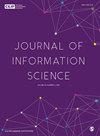You change the way you talk: Examining the network, toxicity and discourse of cross-platform users on Twitter and Parler during the 2020 US Presidential Election
IF 1.7
4区 管理学
Q3 COMPUTER SCIENCE, INFORMATION SYSTEMS
引用次数: 0
Abstract
This study examines code-switching behaviours of cross-platform social media users specifically between Twitter and Parler during the 2020 US Presidential Election. Utilising social identity theory as a framework, we examine messages related to voter fraud by users who migrated from Twitter to Parler following Twitter bans. Our analysis covers 38,798 accounts active on both platforms, analysing 1.5 million tweets and more than 100,000 parleys. The key findings of the study are as follows: First, we discovered differing levels of network homophily between high degree centrality and low-degree centrality cross-platform users, illustrating how individuals with varying degrees of influence engage differently across platforms. Second, we observed higher toxicity levels in heterogeneous networks, which include both in-group and out-group members, compared with homogeneous networks that are primarily composed of in-group members. This suggests the level of toxicity in online spaces correlates with the level of group diversity. Third, we found that cross-platform users created distinctive discourse community with in-group and out-group members, indicating that content and discussions within these networks are influenced by the social identity dynamics of the users. Our study contributes to the current research in political communication and information science by proposing comparative user analyses across multiple social media platforms. Focusing on a critical period of platform transition during a contentious political event, our study offers insights into the dynamics of online communities and the shifting nature of political language used by social media users.你改变了你说话的方式:考察 2020 年美国总统大选期间 Twitter 和 Parler 上跨平台用户的网络、毒性和言论
本研究探讨了 2020 年美国总统大选期间跨平台社交媒体用户在 Twitter 和 Parler 之间的代码转换行为。我们以社会身份理论为框架,研究了在 Twitter 被禁之后从 Twitter 转移到 Parler 的用户所发布的与选民欺诈相关的信息。我们的分析涵盖了活跃在这两个平台上的 38,798 个账户,分析了 150 万条推文和 10 万多条议论。研究的主要发现如下:首先,我们发现了高度中心性和低度中心性跨平台用户之间不同程度的网络同源性,这说明了具有不同程度影响力的个人在不同平台上的参与方式是不同的。其次,我们观察到,与主要由群内成员组成的同质网络相比,同时包括群内和群外成员的异质网络中的毒性水平更高。这表明网络空间的毒性水平与群体多样性水平相关。第三,我们发现跨平台用户与群体内和群体外成员共同创建了独特的话语社区,这表明这些网络中的内容和讨论受到了用户社会身份动态的影响。我们的研究通过提出跨多个社交媒体平台的用户比较分析,为当前的政治传播和信息科学研究做出了贡献。我们的研究聚焦于一个有争议的政治事件中平台过渡的关键时期,为网络社区的动态以及社交媒体用户所使用的政治语言的性质转变提供了见解。
本文章由计算机程序翻译,如有差异,请以英文原文为准。
求助全文
约1分钟内获得全文
求助全文
来源期刊

Journal of Information Science
工程技术-计算机:信息系统
CiteScore
6.80
自引率
8.30%
发文量
121
审稿时长
4 months
期刊介绍:
The Journal of Information Science is a peer-reviewed international journal of high repute covering topics of interest to all those researching and working in the sciences of information and knowledge management. The Editors welcome material on any aspect of information science theory, policy, application or practice that will advance thinking in the field.
 求助内容:
求助内容: 应助结果提醒方式:
应助结果提醒方式:


